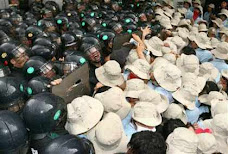
UN blames rich nations for food shortages
By Elisabeth Rosenthal and Andrew Martin
Tuesday, June 3, 2008
ROME: Resolving the global food crisis could cost as much as $30 billion a year, and wealthier nations are doing little to help developing nations, United Nations officials said here Tuesday.
Dozens of world leaders - from President Nicolas Sarkozy of France to President Mahmoud Ahmadinejad of Iran to President Robert Mugabe of Zimbabwe to the secretary general of the United Nations, Ban Ki Moon - descended on Rome on Tuesday for a three-day conference devoted to food security at a time when food prices are at their highest in more than three decades and food stores are at perilous lows.
Jacques Diouf, director general of the UN Food and Agriculture Organization and host of the summit, sharply criticized wealthy nations that he said were cutting spending on agriculture programs for the world's poor while spending billions on carbon markets, subsidies for their own farmers and biofuel production.
"The developing countries did, in fact, forge policies, strategies and programs that, if they had received appropriate funding, would have given us world food security," Diouf said, adding that the international community finally mobilized to help only after images of food riots and hunger emerged in the media.
He said there had been plenty of meetings on the need for anti-hunger programs and agricultural development in poor nations in the last decade, but not enough money to make them a reality.
Another major debate at the conference centered on the role of biofuels in producing food shortages. The U.S. delegation here, headed by Agriculture Secretary Ed Schafer, maintains that only 2 to 3 percent of the increases in food prices are attributable to the biofuel boom. But UN officials said the contribution was much higher.
Biofuel production affects food prices because farmers in many countries have switched from growing crops for food to growing crops for fuel.
Diouf criticized policies like those in the United States that subsidize growing crops for energy. He said that billion-dollar subsidies and protective tariff policies "have the effect of diverting 100 million tons of cereals from human consumption, mostly to satisfy the thirst for fuel for vehicles."
President Luiz Inácio Lula da Silva of Brazil argued that some biofuels could provide a solution to world hunger if properly deployed. In Brazil, where biofuel is made from sugar cane, the industry has provided jobs for poor people as well as sustainable fuel, he said.
The idea that biofuels have caused the world hunger crisis is "an oversimplification" and "an affront that does not stand up to serious discussion," da Silva said. He instead blamed high fuel prices for the high cost of food.
"It offends me to see fingers pointed at biofuels, when the fingers are coated in oil and coal," he said.
There was little disagreement at the meeting about what measures were needed to resolve the spiraling costs of food and its impact on the world's poor: more food aid; additional seeds and fertilizer for poor farmers; fewer export bans and tariffs that restrict the flow of trade; and more agriculture research to improve crop yields.
Ban, the UN secretary general, appealed for immediate financial support from wealthy nations.
"I call on you to take bold and urgent steps to address the root cause of the global food crisis," he said. "This will not be easy. It may require big increases in financial support."
Robert Zoellick, president of the World Bank, said his goal for the conference was to come away with specific proposals for action, rather than its simply being "a talkfest." He emphasized three immediate priorities: helping the 20 most vulnerable countries feed its hungry; providing seeds and fertilizer to small farmers before the upcoming planting season; and scrapping export bans and restrictions.
Some food experts emphasized that high prices reflected global changes that are likely to be longstanding.
"As high as food prices are, I think over time the overall trend will be to get higher," said Cary Fowler, executive secretary of the Global Crop Diversity Trust.
He said that the current food crisis was different from previous food shortages in that it reflected new and long-term trends: dramatically fluctuating climates in major food-producing countries caused by global warming; higher fuels prices; the shift to meat eating in the developing world; and large foreign currency reserves in countries like Russia and China, allowing them to make large food purchases on the global market.
In addition, the United States and others have suggested that genetically modified crops could play a key role in helping poor nations grow more food, a point that some governments and nonprofit organizations strongly oppose. The United States is by far the world's leading producer of genetically modified crops and seeds.
And at a meeting devoted largely to the economics of food, dominated by talk of biofuels and genetically modified crops, many charitable groups said more basic concerns had been overlooked.
Susan Shepherd of Médecins Sans Frontières said that in Niger, where she works, higher prices meant that families bought less food - or less nutritious food - for their children.
"Even Ban Ki Moon was talking about economics. The only one who really focused on hunger and malnutrition - about the people who go hungry - was the pope," she said, referring to a message from Pope Benedict XVI read at the conference.































No hay comentarios:
Publicar un comentario